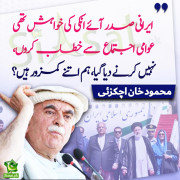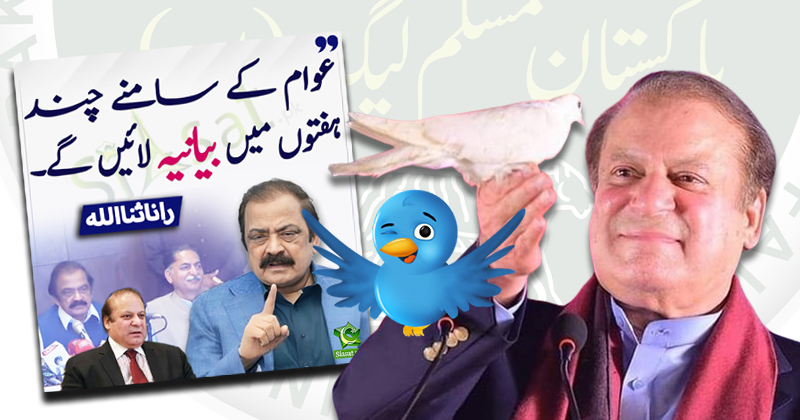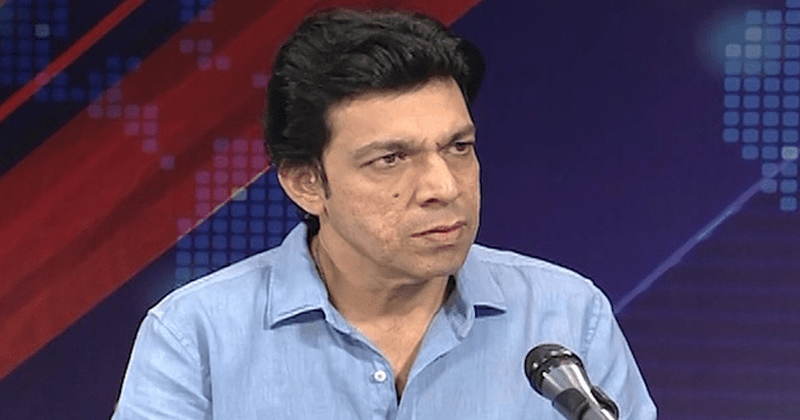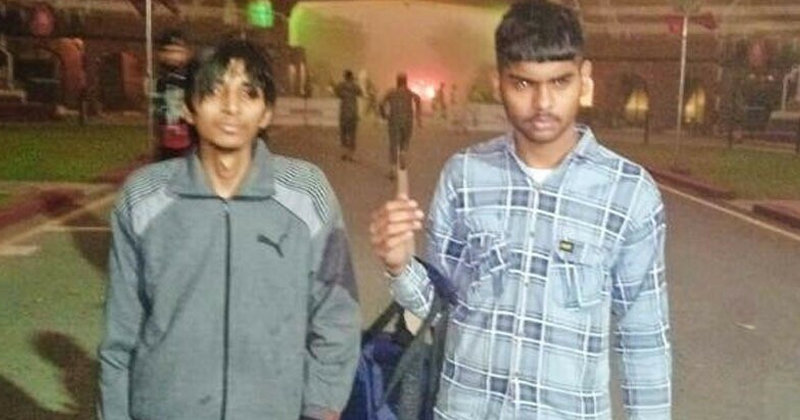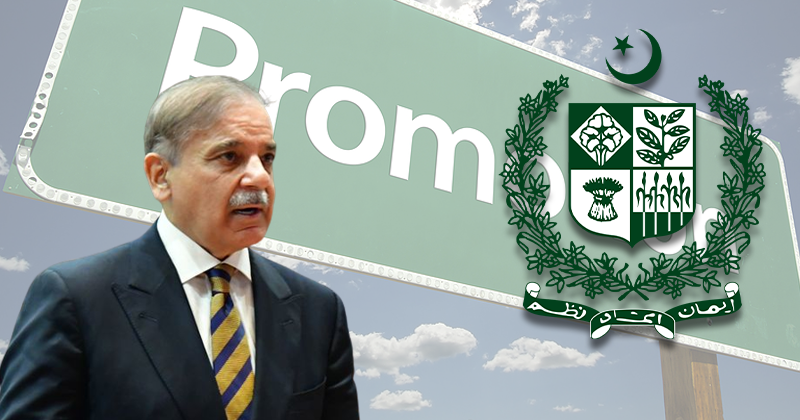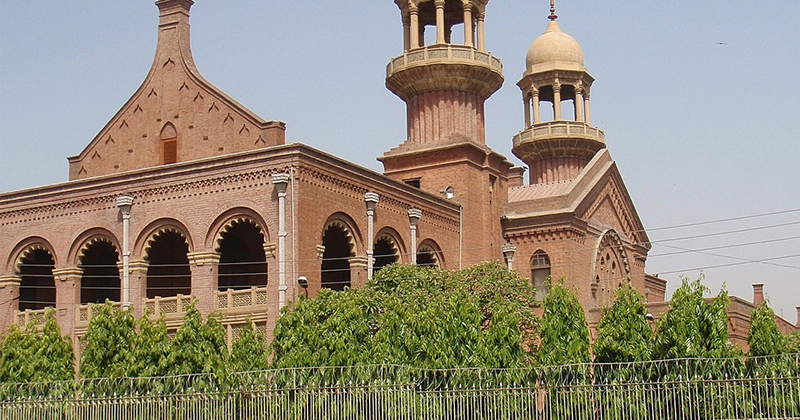President of the United States Donald John Trump and Pakistan's former prime minister Mian Mohammad Nawaz Sharif are both under investigation by law enforcement agencies in their respective countries. Both men allege that they are victims of conspiracies against them by the "Criminal Deep State", better known as "the establishment" in Pakistan. The two men have accused the investigators, prosecutors and the judges of being biased against them. Their narratives are strikingly similar. Sharif and Trump have polarized and divided their nations by asking the voters to stand by them and to reject what they describe as a political "witch hunt". Both have succeeded in maintaining the support of the vast majority of their party legislators so far.
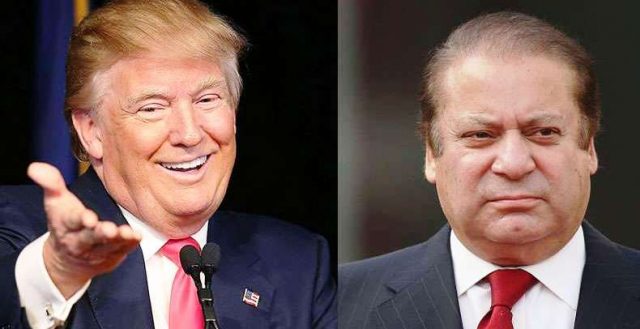
Donald Trump and Nawaz Sharif
Attacking Investigators:
Donald Trump has denounced the FBI teams working for Special Counsel Robert Mueller on Russia Collusion as "partisan Democrats". He has demanded that the FBI be investigated for "spying" on his 2016 presidential campaign. He has called the entire investigation a "witch hunt" by "criminal deep state" actors in the law enforcement and intelligence communities. He has described the FBI raid of his lawyer Michael Cohen's office as a "break-in".
Trump's Republican supporters in the House of Representatives of US Congress have made an unprecedented demand to see documents related to the FBI investigation of the President.
Like Trump, former Prime Minister Nawaz Sharif too has attacked the JIT (Joint Investigative Team) set up the Pakistan Supreme Court as being biased against him. Like Trump, Sharif has denounced the entire process of money laundering investigationagainst him as a "conspiracy" by the "establishment" (Deep State).
Nawaz Sharif's PMLN supporters have so far stood with their leader.
Distrust in Judiciary:
President Trump has repeatedly and viciously attacked judges who have issued orders unfavorable to him. Even before he was elected, candidate Trump accused a US-born judge with a Mexican last name of being biased him because "he is Mexican and I'm building a wall".
Like Trump, Nawaz Sharif has accused his country's Supreme Court judges of acting against him on behalf of the "establishment" (the Deep State).
Politicizing Legal Processes:
Both Trump and Sharif have used the legal accountability they face to rally political support for themselves. By arguing that they both face political witch hunt for their policies and not their alleged conduct, they have fired up their supporters and polarized their nations. Both have delegitimized the institutions of law and justice in their attempts to beat the law enforcement agencies and the justice system in their respective countries.
Attempts by Trump's and Sharif to politicize legal proceedings against them are causing deep divisions in both the United States and Pakistan. These divisions don't augur well for the countries and the future of their institutions. They pose a threat to law and order and national security.
Lying to Law Enforcement:
While the right to remain silent is guaranteed under the 5th amendment of the US constitution, lying to law enforcement officials is a felony that triggers charges of obstruction of justice. These charges can potentially result in serious jail time. While state laws may vary across jurisdictions, obstructing a federal investigation is a felony with a potential five year prison sentence. Some of Trump's aides, including his former national security advisor General Michael Flynn, have already pleaded guilty to lying to the DBI and obstruction of justice charges. Trump's team is trying to avoid the obstruction of justice charges against the President.
Similarly, there are Articles 62 and 63 of the Pakistan constitution that require that the public office holders be honest. While one may question the specific meanings of the words "sadiq" and "ameen" written in the constitution, it is ridiculous to argue that deliberate lying by the highest officials of the country go unpunished. In answers to questions by law enforcement regarding the sources of funds for buying London properties owned by the Sharif family, Mr. Sharif's multiple different conflicting explanations to the parliament, law enforcement and the people constitute a big white lie.
Foreign Residency (Iqama):
Mr. Nawaz Sharif says he has been disqualified by the Supreme Court for Iqama (foreign residency), not Panama (money laundering). What he doesn't acknowledge is that Iqma facilitates Panama. Nor does he fully explain the source of funds used by his children to buy properties in London at the time they were too young to have their own legitimate incomes to afford to buy the properties.
Assets held by people in offshore tax havens are tracked by their country of residence, not by their citizenship, under OECD sponsored Agreement On Exchange of Information on Tax Matters. Pakistan is a signatory of this international agreement. When Pakistan seeks information from another country under this agreement, the nation's FBR gets only the information on asset holders who have declared Pakistan as their country of residence. Information on those Pakistanis who claim residency (iqama) in another country is not shared with Pakistani government. This loophole allows many Pakistani asset holders with iqamas in other countries to hide their assets. Many of Pakistan's top politicians, bureaucrats and businessmen hold residency visas in the Middle East, Europe and North America.
Money Laundering:
Money laundering is a very serious problem resulting in the illicit outflow of trillions of dollars from the poor to the rich countries, according to data compiled by Washington-based Global Financial Integrity. Bloomberg has reported that Pakistanis alone own as much as $150 billion worth of undeclared assets offshore.
There's a direct relationship between investment and GDP. Flight of capital reduces domestic investment and depresses economic growth in poor countries. Lower tax revenues also impact spending on education, health care and infrastructure, resulting in poor socioeconomic indicators.
A recent report by the British National Crime Agency (NCA) has identified Pakistan as one of the top three source countries for money laundering to the United Kingdom where Nawaz Sharif's family owns expensive real estate. Both the UK NCA report and Panama papers show that the politicians and their family members are the biggest culprits in money laundering.
President vs Prime Minister:
Presidents as heads of state in most countries avoid prosecution while in office. Prime Ministers as heads of government do not enjoy the same immunity.
The US president is both the head of state and the head of government. There is no precedent of any US president being indicted while in office. The closest that a prosecutor ever came to indicting a president was in 1974 when President Richard Nixon was named an "un-indicted co-conspirator" in Watergate. President Nixon resigned when he saw that the US Congress was ready to impeach him. Later, President Gerald Ford pardoned President Nixon, sparing him the humiliation of indictment and-or conviction.
In Pakistan, the President does enjoy immunity from prosecution while in office. The Prime Minister does not.
Summary:
Faced with serious charges against them, US President Donald Trump and Pakistan's ex premier Nawaz Sharif are attacking investigators, prosectors and judges in their respective countries. Both are politicizing the legal processes and delegitimizing institutions of democracy in the United States and Pakistan. Their narratives are strikingly similar. They are polarizing their people and dividing their societies. These divisions don't augur well for the countries and their institutions.
http://www.riazhaq.com/2018/05/sharifs-and-trumps-strikingly-similar.html

Donald Trump and Nawaz Sharif
Attacking Investigators:
Donald Trump has denounced the FBI teams working for Special Counsel Robert Mueller on Russia Collusion as "partisan Democrats". He has demanded that the FBI be investigated for "spying" on his 2016 presidential campaign. He has called the entire investigation a "witch hunt" by "criminal deep state" actors in the law enforcement and intelligence communities. He has described the FBI raid of his lawyer Michael Cohen's office as a "break-in".
Trump's Republican supporters in the House of Representatives of US Congress have made an unprecedented demand to see documents related to the FBI investigation of the President.
Like Trump, former Prime Minister Nawaz Sharif too has attacked the JIT (Joint Investigative Team) set up the Pakistan Supreme Court as being biased against him. Like Trump, Sharif has denounced the entire process of money laundering investigationagainst him as a "conspiracy" by the "establishment" (Deep State).
Nawaz Sharif's PMLN supporters have so far stood with their leader.
Distrust in Judiciary:
President Trump has repeatedly and viciously attacked judges who have issued orders unfavorable to him. Even before he was elected, candidate Trump accused a US-born judge with a Mexican last name of being biased him because "he is Mexican and I'm building a wall".
Like Trump, Nawaz Sharif has accused his country's Supreme Court judges of acting against him on behalf of the "establishment" (the Deep State).
Politicizing Legal Processes:
Both Trump and Sharif have used the legal accountability they face to rally political support for themselves. By arguing that they both face political witch hunt for their policies and not their alleged conduct, they have fired up their supporters and polarized their nations. Both have delegitimized the institutions of law and justice in their attempts to beat the law enforcement agencies and the justice system in their respective countries.
Attempts by Trump's and Sharif to politicize legal proceedings against them are causing deep divisions in both the United States and Pakistan. These divisions don't augur well for the countries and the future of their institutions. They pose a threat to law and order and national security.
Lying to Law Enforcement:
While the right to remain silent is guaranteed under the 5th amendment of the US constitution, lying to law enforcement officials is a felony that triggers charges of obstruction of justice. These charges can potentially result in serious jail time. While state laws may vary across jurisdictions, obstructing a federal investigation is a felony with a potential five year prison sentence. Some of Trump's aides, including his former national security advisor General Michael Flynn, have already pleaded guilty to lying to the DBI and obstruction of justice charges. Trump's team is trying to avoid the obstruction of justice charges against the President.
Similarly, there are Articles 62 and 63 of the Pakistan constitution that require that the public office holders be honest. While one may question the specific meanings of the words "sadiq" and "ameen" written in the constitution, it is ridiculous to argue that deliberate lying by the highest officials of the country go unpunished. In answers to questions by law enforcement regarding the sources of funds for buying London properties owned by the Sharif family, Mr. Sharif's multiple different conflicting explanations to the parliament, law enforcement and the people constitute a big white lie.
Foreign Residency (Iqama):
Mr. Nawaz Sharif says he has been disqualified by the Supreme Court for Iqama (foreign residency), not Panama (money laundering). What he doesn't acknowledge is that Iqma facilitates Panama. Nor does he fully explain the source of funds used by his children to buy properties in London at the time they were too young to have their own legitimate incomes to afford to buy the properties.
Assets held by people in offshore tax havens are tracked by their country of residence, not by their citizenship, under OECD sponsored Agreement On Exchange of Information on Tax Matters. Pakistan is a signatory of this international agreement. When Pakistan seeks information from another country under this agreement, the nation's FBR gets only the information on asset holders who have declared Pakistan as their country of residence. Information on those Pakistanis who claim residency (iqama) in another country is not shared with Pakistani government. This loophole allows many Pakistani asset holders with iqamas in other countries to hide their assets. Many of Pakistan's top politicians, bureaucrats and businessmen hold residency visas in the Middle East, Europe and North America.
Money Laundering:
Money laundering is a very serious problem resulting in the illicit outflow of trillions of dollars from the poor to the rich countries, according to data compiled by Washington-based Global Financial Integrity. Bloomberg has reported that Pakistanis alone own as much as $150 billion worth of undeclared assets offshore.
There's a direct relationship between investment and GDP. Flight of capital reduces domestic investment and depresses economic growth in poor countries. Lower tax revenues also impact spending on education, health care and infrastructure, resulting in poor socioeconomic indicators.
A recent report by the British National Crime Agency (NCA) has identified Pakistan as one of the top three source countries for money laundering to the United Kingdom where Nawaz Sharif's family owns expensive real estate. Both the UK NCA report and Panama papers show that the politicians and their family members are the biggest culprits in money laundering.
President vs Prime Minister:
Presidents as heads of state in most countries avoid prosecution while in office. Prime Ministers as heads of government do not enjoy the same immunity.
The US president is both the head of state and the head of government. There is no precedent of any US president being indicted while in office. The closest that a prosecutor ever came to indicting a president was in 1974 when President Richard Nixon was named an "un-indicted co-conspirator" in Watergate. President Nixon resigned when he saw that the US Congress was ready to impeach him. Later, President Gerald Ford pardoned President Nixon, sparing him the humiliation of indictment and-or conviction.
In Pakistan, the President does enjoy immunity from prosecution while in office. The Prime Minister does not.
Summary:
Faced with serious charges against them, US President Donald Trump and Pakistan's ex premier Nawaz Sharif are attacking investigators, prosectors and judges in their respective countries. Both are politicizing the legal processes and delegitimizing institutions of democracy in the United States and Pakistan. Their narratives are strikingly similar. They are polarizing their people and dividing their societies. These divisions don't augur well for the countries and their institutions.
http://www.riazhaq.com/2018/05/sharifs-and-trumps-strikingly-similar.html





